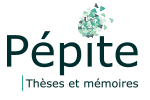Se reconvertir à un métier manuel par l'alternance : projet professionnel, projet identitaire. Ce que permet le dispositif, ce que dévoile l'approche biographique
Retraining in a manual trade through work-linked training : professional project, identity project. What the system allows, what the biographical approach reveals
- Reconversion professionnelle
- Métier manuel
- Formation en alternance
- Approche biographique
- Formation d'adultes
- Formation en alternance
- Travail manuel
- Reconversion professionnelle
- Histoires de vie
- Career changers
- Manual trade
- Vocational education and training
- Biographic approach
- Adults training
- Langue : Français
- Discipline : Sciences de l'éducation et de la formation
- Identifiant : 2022ULILH026
- Type de thèse : Doctorat
- Date de soutenance : 15/11/2022
Résumé en langue originale
Notre thèse interroge les parcours d'adultes qui, au mitan de leur vie professionnelle, ont fait le choix de se reconvertir à un métier manuel. Yohan, Fabien, Ingrid et quelques autres ont ainsi renoncé à leur carrière dans le tertiaire et à leur position sociale pour entreprendre ce type de reconversions. Dans un contexte éminemment paradoxal, où les pressions du monde du travail rencontrent un appel à la liberté de choisir, ils sont devenus charpentier, chaudronnier, peintre décorateur, ou encore menuisier. Pour se former, ils ont mobilisé un dispositif en alternance, intégrant des CFA (Centres de Formation par l'Apprentissage) au milieu de jeunes apprentis. Notre thèse tente de reconstruire leurs parcours singuliers, souvent invisibilisés et finalement mal connus. Tardives et souvent radicales, ces reconversions convoquent la question des choix et leurs motivations, que le sens de l'activité semble articuler. Comment rendre intelligibles ces parcours ? Des entretiens semi-directifs ont permis d'en retracer les grandes étapes autant que les lignes de force. Parmi elles, le sens de la démarche et la valeur ajoutée de l'alternance. Mais quelque chose continuait de nous échapper. Le recours à un protocole biographique, complémentaire, a dévoilé d'autres dimensions en jeu dans ces parcours. Par la mise en récit de leur histoire individuelle, familiale et sociale, à la faveur de réalisations graphiques, les adultes impliqués ont pu prendre conscience de « liens invisibles » et finalement de nœuds que les reconversions s'emploient vraisemblablement à dénouer.
Résumé traduit
Our thesis examines the career paths of adults who, at the mid-point of their professional lives, have chosen to switch to a manual trade. Yohan, Fabien, Ingrid and a few others gave up their careers in the service sector and their social position to undertake this type of reconversion. In an eminently paradoxical environment, where the pressures of the world of work meet a call for freedom of choice, they became carpenters, boilermakers, decorative painters or even carpenters. In order to form themselves, they resorted to vocational education and training, integrating a work-study training center, among young apprentices. Our doctoral research attempts to reconstruct their singular paths, which are often invisible and ultimately poorly known. Late and often radical, these reconversions raise the question of choices and their motivations, which the meaning of the activity seems to articulate. How can these paths be made intelligible? Semi-structured interviews made it possible to retrace the main stages as well as the lines of strength. Amongst them, the meaning of the approach and the added value of the training system. But something continued to elude us. The use of a complementary biographical protocol revealed other dimensions at play in these paths. By narrating their individual, family and social stories, through the use of graphics, the adults involved were able to become aware of "invisible links" and finally of nodes that the reconversions are probably trying to unravel.
- Directeur(s) de thèse : Baujard, Corinne
- Président de jury : Niewiadomski, Christophe
- Membre(s) de jury : Triby, Emmanuel - Maillard, Fabienne - Merhan, France
- Rapporteur(s) : Janner-Raimondi, Martine - Breton, Hervé
- Laboratoire : Centre interuniversitaire de recherche en éducation (Villeneuve d'Ascq, Nord)
- École doctorale : École doctorale Sciences de l'homme et de la société (Lille ; 2006-....)
AUTEUR
- Leonard, Erika



